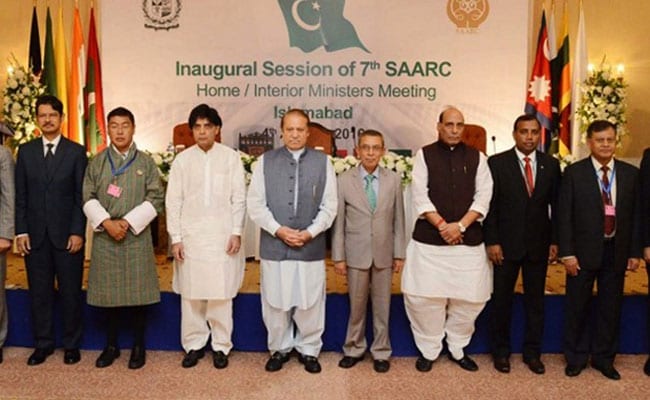Considering the rising bitterness in the bilateral relationship, which over the last few days and weeks has become considerably aggravated as several parts of the Pakistani establishment have competed with each other to criticise the Indian government's handling of the Kashmir crisis, Singh's day-long visit to Islamabad was marked by an icy coolness that rivaled the frigid polar cap.
Singh barely shook hands with his Pakistani counterpart, interior minister Chaudhry Nisar Ali Khan, who stood at the entrance to the hall at the Serena Hotel in Islamabad receiving his guests where the SAARC meeting was being held. He skipped lunch too, just in case he was forced to make small talk with any Pakistanis seated to his right or left or across him on the table.

Rajnath Singh with delegates, including Pak PM Nawaz Sharif, after inauguration of the SAARC conference
More than once, Sharif has told a variety of audiences at home, since the killing of Burhan Wani on July 8, that Kashmir was no longer an "internal matter" of India. Speaking to a gathering of Pakistani envoys in Islamabad yesterday, Sharif added that Kashmir was witnessing a "new freedom movement (which is) running in the blood of the third generation of the Kashmiri people..."
Under the circumstances, the fact that Singh went to Pakistan at all - when India could have sent either a junior minister or just a bureaucrat, the Home Secretary even - is interesting. It shows that Prime Minister Narendra Modi wanted to keep the door ajar, albeit ever-so-slightly, and not shut it down completely, keeping in mind any possible future dialogue between the two countries.
That was an intelligent thing to do. For Modi not to have sent Rajnath Singh would have been a churlish thing to do - certainly not in keeping with India's self-image that it is a large country with the responsibility to lead this part of the world. Certainly, Modi would have kept one eye on the Americans as he made his decision - the Americans would have encouraged him to go for precisely the same reasons.
So Singh went to Pakistan, made his speech at the SAARC conference and returned home. Media reports from Pakistan have indicated that his speech was blacked out - meaning, no TV channel was allowed to cover it, besides Pakistan TV (the Pakistani equivalent of Doordarshan) and PTV did not broadcast even parts of his speech.
Interestingly, government sources have since denied that Singh's speech was blacked out. "It is standard practice that the opening statement by the host country is open to the media while rest of the proceedings are in camera, which allows for a full and frank discussion of issues," the sources said.
Perhaps Delhi was reacting, post-haste, to the realisation that Sharif's speech at the SAARC conference had made no mention of Kashmir at all. Perhaps Sharif, who has been at the forefront of Pakistani people's desire to resume normal relations with India, also realised that any mention of the ongoing unrest in Kashmir in Singh's presence would amount to unnecessary provocation.
Should the Indian government care that Singh's speech was blacked out by the Pakistani establishment? In the age of social media, that is an impossibility. Singh's speech has been on the government-owned website within a couple of hours of him delivering it, while his media handlers have ensured that the message has reached his audience, both at home and abroad.
(It is another matter that, unlike Modi or Sushma Swaraj's social media handlers, Singh's social media team was simply absent from both Twitter and Facebook in putting across his message in real time.)
The bigger issue is that Modi may have played a risky hand - and won. By sending Singh to Pakistan, he showed that India was committed to the SAARC process. (Remember that the Bangladeshi Home Minister didn't show up, a likely indication of his displeasure against Pakistan allegedly sponsoring instability in his country.) The PM also got Singh to use the SAARC forum to make critical comments about Pakistan's continued use of terrorism as a weapon of diplomacy.
"We are witness to mounting threats and incidents that endanger our region's peace and stability," said Singh in his speech, referring not only to Pakistan's alleged instigation of cross-border terrorism into India, but also inside Afghanistan and even, Bangladesh.
In fact, the Home Minister also got to use his favourite line, that "one country's terrorist cannot be a martyr or freedom-fighter for anyone." Certainly, it was the addition of the word, "martyr," a reference to the Hizbul Mujahideen commander Burhan Wani, that is new here. Singh went on to add that under "no circumstances should terrorists be eulogised as martyrs."
So does Singh's visit mean that Modi will go to Islamabad for the SAARC summit later this year?
Or does the Bangladeshi Home Minister's refusal to attend the SAARC meeting in Pakistan today mean more than his mere absence would normally indicate?
Therein lies a story, one that is only brewing just yet.
(Jyoti Malhotra has been a journalist for several years and retains an especial passion for dialogue and debate across South Asia.)
Disclaimer: The opinions expressed within this article are the personal opinions of the author. The facts and opinions appearing in the article do not reflect the views of NDTV and NDTV does not assume any responsibility or liability for the same.


